Programação do I Workshop BIOJUSPAN
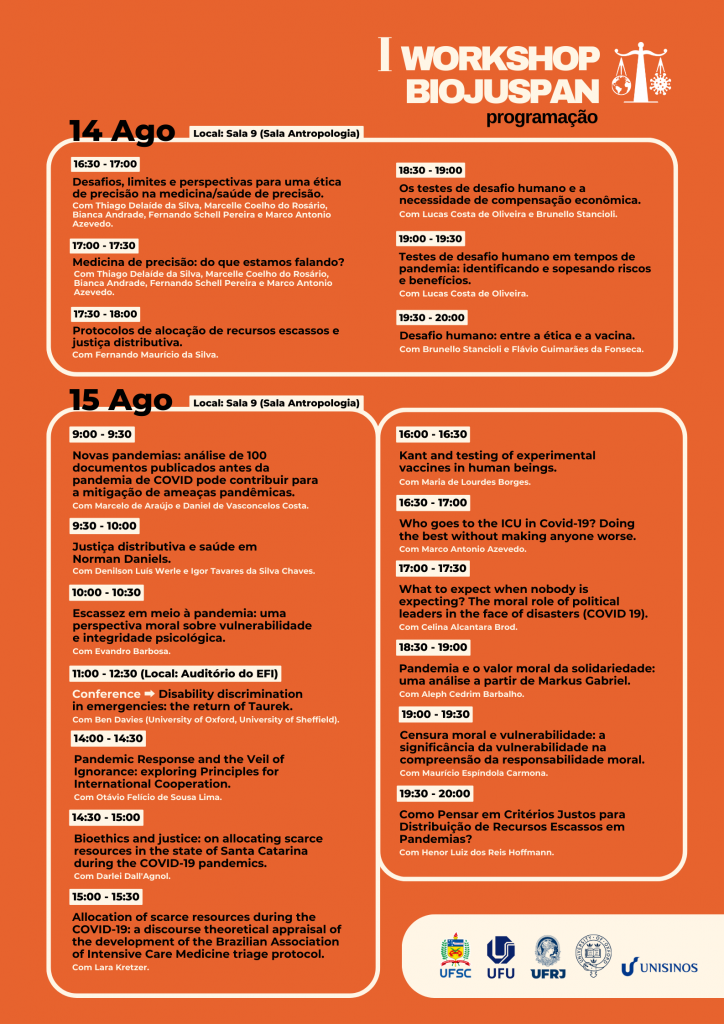

 Participe do lançamento do novo livro do nosso coordenador de projeto Darlei Dall’Agnol 🙂
Participe do lançamento do novo livro do nosso coordenador de projeto Darlei Dall’Agnol 🙂
“Bioética, Biodireito & Biopolítica: Reflexões filosóficas sobre uma pandemia”
O evento acontecerá dia 16/08 (quarta-feira) às 17:30 em frente ao auditório EFI na UFSC.
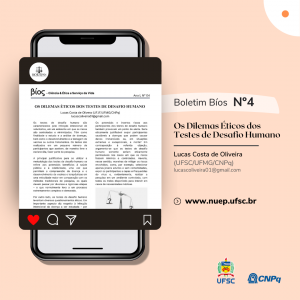 Confira o 4º número do Boletim Bíos – Ciência e Ética a Serviço da Vida! 🤓
Confira o 4º número do Boletim Bíos – Ciência e Ética a Serviço da Vida! 🤓
“Os dilemas éticos dos testes de desafio humano“, escrita pelo nosso pós-doutorando Lucas Costa de Olivera.
Já está no ar tudo o que vai rolar no I Workshop BIOJUSPAN, que acontecerá entre 14-16 de Agosto dentro do 13° Principia.
Check out the new book that was published by one of our researchers.
 Moral Challenges in a Pandemic Age
Moral Challenges in a Pandemic Age
by Evandro Barbosa
The COVID-19 pandemic, whose consequences will be felt in the long term, can be interpreted as a signal that we have been living in a pandemic age. A pandemic is humanity’s common ground, so the moral problems inherent in it are of interest to everyone from now on. It brought a set of moral challenges that cannot be ignored.
This book – which emerged amid the novel coronavirus crisis – is designed to fill the gap in the current literature on the topic, offering an original approach to its moral implications. It can be taken as a guide in the face of these pandemic-age challenges for human relations.
The pandemic is a multifaceted phenomenon, and its debate involves a wide variety of practical philosophical concerns. All the chapters of this book, divided into four sections, aim to clarify its central aspects, while each chapter provides an original approach to the debate’s leading issues and relies on each most significant collaborator’s expertise. Also, they reflect their unique pandemic experiences under the scrutiny of philosophical unrest.
Since the pandemic is an ongoing event, Moral Challenges in a Pandemic Age will be of interest to professors, students, and researchers engaged in understanding the ethical dimension of the age we are experiencing. The problems addressed in this collection transcend the boundaries of the philosophical field, offering an innovative approach to individuals keen on discussing the pandemic from a moral point of view. Such a discussion encompasses the philosophical inquiry but is not restricted to it. Those interested in related areas such as psychology, sociology, biology, public health, education, anthropology, and cultural studies – to name a few – will find connections with parallel themes in this book. In addition, the collection brings a theoretically supported approach to several related debates in a language accessible to anyone who wants to know more about the topic.
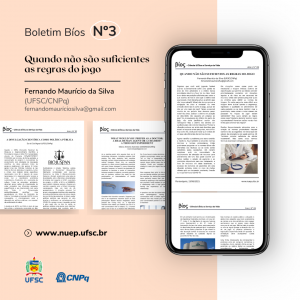 Confira o 3º número do Boletim Bíos – Ciência e Ética a Serviço da Vida! 🤓
Confira o 3º número do Boletim Bíos – Ciência e Ética a Serviço da Vida! 🤓
“Quando não são suficientes as regras do jogo”, escrita pelo nosso pós-doutorando Fernando Maurício da Silva.
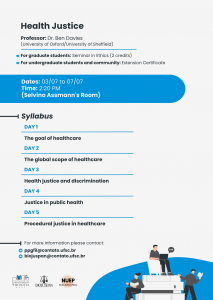 Convidamos a todas as pessoas interessadas a realizar o curso “Health Justice” que será ministrado pelo professor visitante Dr. Ben Davies (University of Oxford/University of Sheffield).
Convidamos a todas as pessoas interessadas a realizar o curso “Health Justice” que será ministrado pelo professor visitante Dr. Ben Davies (University of Oxford/University of Sheffield).
Para a(o)s discentes de Mestrado e Doutorado do PPGFil/UFSC, o curso poderá ser validado como uma disciplina de 2 créditos. Informações para a matrícula aqui.
A(O)s discentes de graduação e da comunidade com freqüência suficiente (75%) terão direito a obter certificado de extensão (20h) fornecido pela UFSC.
Quando: 03/07 a 07/07/2023
Horário: 14:20h
Local: Sala Selvino Assmann (CFH, 2º andar, Bloco D)
Programa da disciplina (syllabus)
 Boletim Bíos – Ciência e Ética a Serviço da Vida! 🤓
Boletim Bíos – Ciência e Ética a Serviço da Vida! 🤓
Confira nossa nova publicação: “What would you prefer as a doctor: a real human agent or a Chatbot? A thought experiment”, escrita pelo nosso pesquisador Marco Antonio Azevedo.
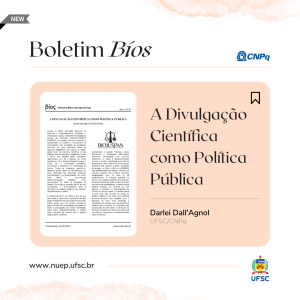 Está no ar o novo Boletim Bíos – Ciência e Ética a Serviço da Vida! 🤓
Está no ar o novo Boletim Bíos – Ciência e Ética a Serviço da Vida! 🤓
O boletim tem como objetivo divulgar os resultados parciais do projeto BIOJUSPAN.
Confira já a publicação de lançamento: “A Divigulgação Científica como Política Pública”, escrita pelo coordenador do projeto Darlei Dall’Agnol.
Check out the new book that was published by two of our researchers.
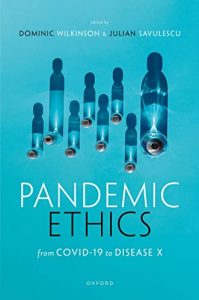 Pandemic Ethics: From COVID-19 to Disease X
Pandemic Ethics: From COVID-19 to Disease X
by
Yet while COVID-19 is catastrophic, it is not unique. Children who have been home-schooled during COVID-19 will almost certainly face another pandemic in their lifetime – one at least as bad-and potentially much worse-than this one. The WHO has referred to such a future (currently unknown) pathogen as “Disease X”.
The defining feature of a pandemic is its scale-the simultaneous threat to millions or even billions of lives. That scale leads to unavoidable ethical dilemmas since the lives and livelihood of all cannot be protected.
But since one of the most powerful ways of arresting the spread of a pandemic is to reduce contact between people, pandemic ethics also challenges some of our most widely accepted ethical beliefs about individual liberty and autonomy.
Finally, pandemic ethics brings vividly to the foreground debates about the structure of society, inequalities, disadvantage and our global responsibilities.